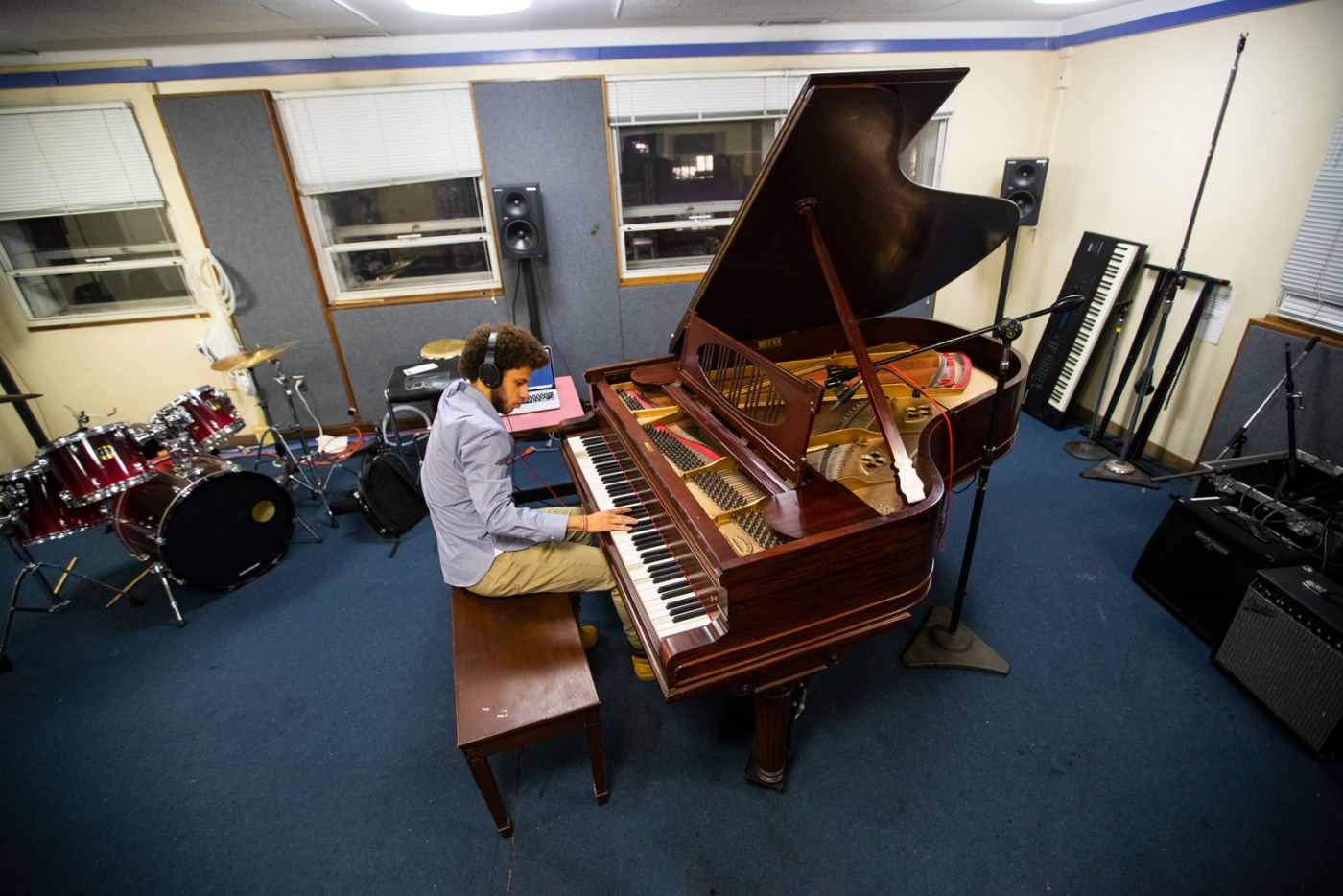PROVIDENCE, R.I. [Brown University] — Having been born to Chilean and Trinidadian American parents, splitting her developmental years between Italy and Chile, and attending university in the U.S., Maita Eyzaguirre often feels like she exists in the middle of “a million different cultures and worlds.”
And that perspective was one significant factor in why the composer and soon-to-graduate Brown University senior grew bored at her previous art and music school in New York. “I got tired of studying something really specific with people who only ever studied that same thing,” Eyzaguirre said.
The restrictive nature of her academic experience, along with what she described as persistent instances of racism and sexism, led Eyzaguirre to take her talents elsewhere. She settled on Brown, drawn largely by the opportunity to develop a personalized course of study through the University’s distinctive undergraduate education.

“I was really excited about the fact that I could engage as intensely with music as I could with courses on indigenous food politics or the history of colonial education,” Eyzaguirre said. “The Open Curriculum was the perfect antidote to art school.”
Eyzaguirre is one of 120 “.5ers” who will complete Brown degree requirements in December. On Saturday, Dec. 7, most will take part in the University’s annual Midyear Completion Ceremony. Eyzaguirre and fellow .5er Warner Meadows will offer student addresses at the ceremony; Dean of the College Rashid Zia will preside and Associate Professor of German Studies Kristina Mendicino will offer reflections on behalf of the faculty.
Reasons for finishing studies mid-year vary widely. Some students arrive mid-study as transfers for other institutions. Some take time off to intern, volunteer or work. Others leave to travel or pursue creative projects. Sometimes academic or medical issues motivate a leave.
For Eyzaguirre, the decision was quite personal.
It began with a trip to Chile to visit her family and ended with her father’s diagnosis of liver cancer. She stayed with her family through the diagnosis, the search for a donor and eventually, a successful transplant, becoming a full-time caregiver to her father, and by extension, the rest of her family.
Although everyone survived, Eyzaguirre returned to Brown a year later carrying a burden of grief that made it difficult to function. In addition to nearly losing her father, she said the cultural differences between her home in Chile and the U.S. were stark. She was lonely and missed her family.
Eyzaguirre said her story may have turned out very differently if it weren’t for support from a faculty mentor and a treasured experience through a student organization.
Because Rachel Kantrowitz is a visiting scholar in the education department, Eyzaguirre wasn’t sure whether Kantrowitz would still be at Brown when she resumed her studies in Fall 2017. But she was, and her presence and advice was crucial to Eyzaguirre as she transitioned back into her studies.
“The fact that she knew me before and after such a difficult time in my life was so important for me, especially after feeling like I had lost a part of myself,” Eyzaguirre said.
In addition to her deep engagement with Kantrowitz’s teaching and course materials, which focused on education through a postcolonial lens, Eyzaguirre said that the support she received from Kantrowitz — through sharing her own experiences of caregiving for a family member, advising her during office hours or attending as many performances and premieres as possible — offered encouragement at a time when she didn’t always see her experiences reflected among her peers.
During one of her classes, Kantrowitz hosted a presentation from a student organization called Brown Refugee Youth Tutoring and Enrichment (BRYTE), which prompted Eyzaguirre to apply to the program.
Through BRYTE, she began tutoring a 9-year-old girl from a family who had recently resettled from Syria. And though she was only required to spend three hours per week providing tutoring, Eyzaguirre soon found herself building a strong relationship with the family.
“I never expected that program to be so meaningful in my life,” she said. “I felt like I got a second family.”
Kantrowitz taught Eyzaguirre to advocate for herself, a lesson she passed on to the family. Someone described the work she was doing as “carving out space for herself,” a concept in which she found solace.
“It’s an important way for me to feel happy and whole,” Eyzaguirre said. “It’s a really nice way to exist with all of the good and all of the bad and grow from it.”
“… To carve out a space” became the title of a composition she had previously written, but revised to feature the viola, often an underrepresented instrument in the music world — a decision she says is symbolic of her own experiences.
“In composition, which is such a white man’s world, there are a lot of ways I can elbow my way into conversations or really make sure I’m acknowledged,” she said. “That piece was a way to explore that.”
The score ended up being selected by the arts nonprofit GRIT Collaborative, and Brown funded a trip to Phoenix for Eyzaguirre to see her piece premiered in concert alongside her mother.
Through the ups and downs of her education, Eyzaguirre never regretted her decision to take a leave.
“It’s important to honor whatever is drawing us to do something outside of this institution,” Eyzaguirre said. “Everybody is a very complex person with all these wonderful different sides to themselves, and the sides that grow are the sides we nurture. It’s a helpful way to value the different things in our lives that are important to us, especially the ones that may be happening outside of Brown.”
For fellow music concentrator Warner Meadows, it was his love of music that brought him to Brown — and eventually drew him away from it for a semester.

The summer before his senior year, he traveled to Philadelphia to produce an album for friends. The project marked a defining experience in his music career. A big step up from his previous work, he wasn’t quite prepared for how much work — from marketing to legal considerations — went into a full-time role producing an album.
And by the end of the summer, it wasn’t finished.
“I felt like I still had so much more to contribute,” Meadows said. “I didn’t want to go back to school feeling as though I hadn’t given it my all.”
Less than two weeks before the semester, he made the choice to stay in Philadelphia.
“I didn’t second guess it, because I knew that I would regret not finishing that album more so than starting my senior year on time,” Meadows said.
The tug-of-war between his academic study and professional obligations is reflective of his college experience. Any time there’s been a breakthrough in his music career, Meadows said he struggled with feeling confident that he was making the right decision to stay on campus. And the energy he poured into his music was depriving him of the full educational experience he desired and that his parents worked so hard to provide.
At Brown, he was able to find a mentor that helped him cultivate success in both. Tricia Rose, director of the Center for the Study of Race and Ethnicity in America and renown for her work in shaping academic study on hip-hop, became an invaluable resource to Meadows.
“I’d go to her office hours, play her music I liked, and pick her brain as much as I could about the current hip-hop scene,” he said. “I can’t say that I could have done that anywhere else. During that time, I really was trying to stay present and appreciate that I was having this incredible experience.”
Meadows said that Rose’s direction, as well as his engagement with the black community and his leadership in the Masculinity 101 program, boosted his confidence.
“Where I went to school before Brown, I was one of maybe eight black people in my grade and only one of four black men,” Meadows said. “Even as a black person who was raised to love myself, we’re still socialized to feel inferior. I probably had internalized biases against myself and other black people. So being here was a great way to reinforce that all those biases were just projected.”
For both Meadows and Eyzaguirre, taking leave helped them develop an internal resolve that led them down a path of self-discovery and success.
“Anyone who has taken leave has been forced to pause and reassess the way they’re spending their time and what their top priorities are,” Eyzaguirre said. “I want to keep pausing at many different points in my life. Embarking upon change can always be scary, but it allows us to exit our comfort zone and enter an area of growth.”